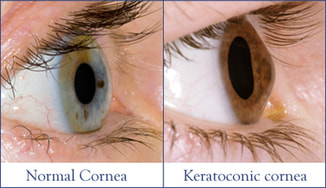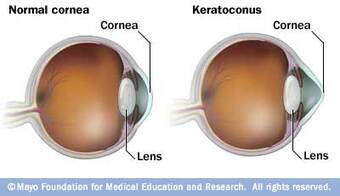KERATOCONUS
Saint Louis' Keratoconus Specialist from Kirkwood Eye Associates on Vimeo.
As of 2017, 1 in 2000 people were diagnosed with Keratoconus. Learn about a new innovative solution.
Keratoconus is a disease of the cornea (the clear front surface of the eye), in which the cornea thins and protrudes outward. It typically begins in teenagers and progresses through the twenties and thirties. It affects men and women equally and early symptoms can include blurry vision (even with soft contacts or glasses) and contact lens intolerance.
The cause of keratoconus is somewhat disputed, but it is well established that it is associated with eye rubbing (especially in children with eye allergies) and contact lens wear. There is also a well established genetic component.
The cause of keratoconus is somewhat disputed, but it is well established that it is associated with eye rubbing (especially in children with eye allergies) and contact lens wear. There is also a well established genetic component.
|
Keratoconus is diagnosed with corneal topography. Severity varies from mild (patients can see well with glasses or soft contacts) to moderate (necessitates ‘hard’ or gas permeable contact lenses) to severe (corneal scarring and/or swelling that can require corneal transplant.
If you have keratoconus, you should be monitored at least every six to twelve months depending on the severity and type of visual correction needed. Monitoring should include corneal topography and corneal thickness measurements, as well as examination to watch for scarring, swelling or rupture of the cornea. |
|
For most patients, finding the right form of vision correction is key. People with keratoconus see best with a rigid lens that covers up the irregularity of the cornea. Dr. Andrew Biondo specializes in fitting patients with keratoconus with Scleral lenses. Scleral lenses are the latest in irregular cornea lens technology and they allow people with the disease to see very well, often 20/20, with great comfort and stability.
Corneal Collagen Cross-Linking is a procedure that may offer corneal stabilization for people with keratoconus. While the procedure does not offer patients a normal corneal surface, it can halt progression of the disease and that could mean reduced risk of corneal transplantation in the future. |
At Kirkwood Eye Associates, we are leaders in the St. Louis area in the management of keratoconus. Dr. Andrew Biondo speaks nationally to other eye doctors on the topic and acts as a consultant to manufacturers and doctors alike. If you have keratoconus, call us today for an evaluation and consultation with Dr. Biondo.


